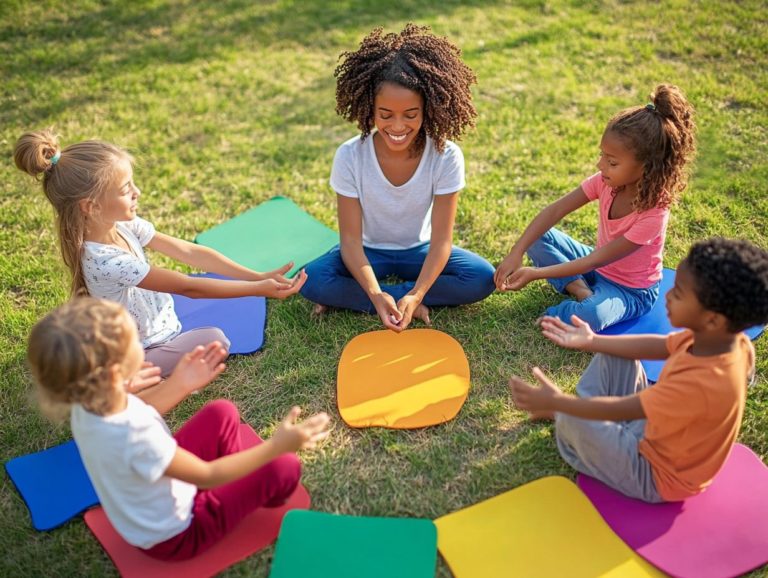Yoga Techniques for Mindful Parenting
Mindful parenting is a transformative approach that empowers you to remain present and engaged in your children s lives, fostering better parent-child relationships.
In a world where the demands of modern parenting often breed stress and anxiety, practicing mindfulness can cultivate deeper connections and enhance emotional well-being for both you and your children.
This article delves into how integrating yoga techniques into your parenting routine can elevate your mindfulness, providing you with practical tips, breathing exercises, and valuable insights.
From deep breathing exercises to crafting a mindful home environment, discover the enriching ways yoga can elevate your parenting journey.
Contents
- What Are the Benefits of Yoga for Children!
- Yoga Techniques for Mindful Parenting
- Incorporating Yoga into Daily Parenting
- 4. Taking Care of Yourself as a Parent
- Frequently Asked Questions
- What are some benefits of practicing yoga for mindful parenting?
- How can yoga techniques help parents stay present in the moment?
- What are some specific yoga techniques that can be helpful for mindful parenting?
- How can yoga techniques help parents manage stress and emotions?
- Is it necessary to have prior yoga experience to practice mindful parenting, especially in places like Pleasantville, New York?
- How can parents incorporate yoga techniques into their daily routines to benefit their children and themselves?
Key Takeaways:

- Incorporating yoga into daily parenting can lead to a more mindful and peaceful household, fostering better parent-child interactions.
- Deep breathing exercises and guided meditations can help parents and children manage stress and improve overall well-being.
- Creating a mindful environment and practicing self-care are crucial aspects of mindful parenting.
- Understanding children s needs and responding with patience and compassion improve parenting success.
What is Mindful Parenting?
Mindful parenting is an intentional approach that highlights the significance of being fully present and aware in your relationship with your child. It helps reduce stress and anxiety while promoting managing emotions and understanding.
It encourages you to cultivate patience and compassion, enabling you to respond thoughtfully to your child s needs and behaviors. By nurturing a mindful environment, you can enhance your communication and interactions with your child, ultimately elevating their emotional well-being and mental health.
Why is Mindful Parenting Important?
In today s fast-paced world, mindful parenting is not just beneficial; it s essential. This approach equips you with the tools to manage stress and anxiety while nurturing a profound connection with your children, ultimately enhancing the overall parent-child relationship.
Embrace mindful practices to transform your parenting! By adopting these practices, you can significantly elevate your communication skills, paving the way for a more open and honest dialogue with your children improving your parent-child relationship.
This method enables you to express your thoughts and feelings more effectively while honing the ability to listen empathetically, which is essential for managing emotions.
As you model mindfulness, you impart valuable lessons of resilience and emotional intelligence to your children. These qualities are critical for fostering healthy relationships and ensuring their mental well-being.
Ultimately, these intentional interactions cultivate a nurturing environment where your children feel secure, understood, and valued, laying a solid foundation for their growth and future connections.
How Can Yoga Help with Mindful Parenting?
Yoga serves as an essential ally in your journey of mindful parenting. It offers techniques that effectively reduce stress, enhance emotional regulation, and cultivate mindfulness.
By incorporating these practices, you can significantly elevate the quality of your interactions with your child, fostering a deeper and more meaningful connection.
What Are the Benefits of Yoga for Parents?
Practicing yoga presents an array of benefits for you as a parent, including effective stress relief, enhanced emotional regulation, and heightened mindfulness. These elements collectively contribute to improved mental health and a more compassionate approach to parenting.
By incorporating simple yoga routines into your daily life, you can create a tranquil environment that nurtures emotional resilience. This practice equips you to navigate the diverse challenges of parenting, whether it s managing temper tantrums or juggling the demands of work-life balance.
Engaging in yoga inspires self-reflection and awareness, enabling you to respond to your children with patience and understanding. By centering yourself through this practice, you not only reduce anxiety levels but also cultivate a deeper connection with your little ones, fostering a harmonious family dynamic and promoting overall well-being.
What Are the Benefits of Yoga for Children!
What Are the Benefits of Yoga for Children?
Yoga offers you a wealth of benefits, including improved emotional regulation, heightened mindfulness, and enhanced developmental skills. This practice proves especially valuable for children with ADHD, autism, and other learning disabilities. Practicing yoga can also have a positive impact on their overall development.
Engaging in this ancient discipline fosters a sense of calm and awareness, enabling young practitioners to recognize and manage their emotions more effectively.
By participating in age-appropriate poses and breathing exercises, children can cultivate focus while soothing their minds, which is particularly advantageous for those grappling with attention and social skill challenges.
Yoga creates an inclusive atmosphere where all children, regardless of their developmental needs, can feel enabled and connected to their bodies. This holistic approach not only nurtures mental well-being but also encourages social interactions, allowing them to build resilience and adeptly cope with daily stresses.
Yoga Techniques for Mindful Parenting
Incorporating specific yoga techniques into your mindful parenting approach can significantly enhance your emotional regulation and alleviate stress. This practice fosters a deeper sense of presence during your interactions with your children, ultimately creating a more harmonious family environment.
1. Deep Breathing Exercises

Deep breathing exercises can significantly improve focus and emotional regulation, helping you better respond to stressful situations.
They are essential for you to achieve mindfulness and emotional regulation, enabling you to manage stress effectively and respond calmly to your children’s behaviors.
By focusing on your breath, you create a crucial moment of pause that can transform an automatic response into a more thoughtful response. This practice fosters awareness of the present moment, bringing clarity to your thoughts and feelings.
As you engage in these exercises regularly, you’ll discover how to cultivate a sense of calm amidst the chaos of daily life. This stability not only benefits you but also serves as a positive example for your children, showing them how to face challenging situations with grace.
These techniques nurture emotional resilience and promote healthier family interactions, making them invaluable tools for navigating the complexities of everyday life.
2. Mindful Meditation
Mindful meditation can enhance awareness and help you manage emotions, making you more empathetic in your interactions.
Mindful meditation is a powerful practice that invites you to focus on the present moment, enhancing your emotional well-being and refining your parenting approach through heightened awareness.
By weaving these techniques into your daily routine, you can cultivate a profound sense of calm and clarity, which proves invaluable during those particularly stressful moments with your children. This method not only aids in managing your own emotions but also sets a positive example for your kids, teaching them the essential skills of self-regulation and mindfulness.
Engaging in mindful meditation allows you to observe your thoughts and feelings without judgment, creating a compassionate atmosphere at home. As you grow more attuned to your actions and reactions, you ll find yourself responding to your children’s needs with increased empathy and understanding, ultimately forging stronger and healthier relationships.
3. Partner Yoga
Partner yoga creates a deeper bond between you and your child, offering a remarkable opportunity to cultivate mindfulness while strengthening your parent-child relationship.
As you engage in this nurturing practice together, you ll explore not just the physical alignment and poses, but also the emotional connectivity and trust that come with it. This process encourages open communication, fosters empathy, and provides a safe space for both you and your child to express your feelings.
Each session transforms into a shared journey, where laughter and joy can thrive, reinforcing your connection. Whether you re balancing poses or breathing in sync, the intimacy gained through these mindful experiences presents a unique way to build understanding and resilience in your relationship, all while nurturing a sense of community and shared purpose.
4. Yoga Poses for Stress Relief
Incorporating specific yoga poses can dramatically reduce stress while promoting mindfulness and enhancing emotional regulation for both you and your child.
Practicing poses like Child s Pose creates a safe haven, encouraging a sense of surrender and comfort, while the calming Forward Bend establishes a nurturing space for reflection and relaxation. These yoga techniques can also improve focus and emotional regulation.
Downward Facing Dog not only stretches your body but also invites you to focus on your breath, anchoring you in the present moment.
Gentle backbends, such as Cobra Pose, open the heart, allowing for emotional release and relief. By weaving these poses into your regular routine, you foster a deeper connection between your mind and body, ultimately paving the way for healthier stress management strategies and improved emotional well-being.
5. Yoga for Better Sleep
Yoga can also aid in better sleep for both parents and children, improving overall mental health and well-being.
Practicing yoga before bedtime can elevate your relaxation levels, leading to improved sleep quality, which is vital for your emotional well-being and effective parenting. By incorporating gentle stretches and mindfulness techniques, you can prepare your mind and body for a restful night.
Engaging in breathing exercises and meditation can help you cultivate a state of calm, reducing anxiety and promoting deeper relaxation. Quality sleep plays a significant role in mood regulation, making it essential for navigating the challenges of parenting with grace.
By regularly incorporating yoga into your evening routine, you increase your chances of drifting off to sleep more quickly while enhancing the restorative benefits of your slumber. This holistic approach supports your overall well-being, enabling you to tackle your daily responsibilities with enhanced focus and positivity.
Incorporating Yoga into Daily Parenting
Incorporating yoga into your daily parenting routines can profoundly enhance your mindfulness, emotional regulation, and the quality of interactions with your children, ultimately fostering a healthier family dynamic.
By embracing this practice, you create a nurturing environment that not only benefits you but also cultivates deeper connections within your family.
1. Setting Aside Time for Yoga Practice
Setting aside dedicated time for yoga practice is essential for you as a parent to cultivate mindfulness and emotional regulation, which ultimately enhances your approach to parenting.
By making this practice a priority, you can significantly improve your ability to stay present and responsive, reducing stress and elevating your overall well-being. Incorporating yoga into your busy schedule doesn’t have to feel overwhelming; even short, focused sessions can deliver remarkable benefits. Consider starting with brief 10-15 minute sessions during quieter moments of the day, whether that s in the early morning or late evening.
Involving your children in the practice can transform it into a delightful family bonding experience, fostering a shared understanding of relaxation and self-care. By embracing flexibility and creativity in your approach, you can seamlessly integrate yoga into your daily routine, nurturing a healthier mindset for both yourself and your family.
2. Using Yoga Techniques in Daily Interactions with Children

Incorporating yoga techniques into your daily interactions with children can significantly enhance mindfulness and emotional regulation, fostering a more supportive and understanding environment.
Consider starting each day with a few minutes of simple breathing exercises alongside your child. This shared experience of calmness sets a positive tone for the day ahead. When moments of frustration arise, practicing Child s Pose together serves as a gentle reminder to embrace vulnerability and relaxation.
By applying yogic principles, such as maintaining a steady focus while listening to your child’s concerns, you not only improve effective communication but also instill in them the importance of being present. By seamlessly integrating these techniques into your daily routine, you can nurture your own emotional health while cultivating a harmonious family dynamic.
3. Creating a Vibrant and Mindful Environment at Home
Creating a vibrant and mindful environment at home is essential! It nurtures emotional well-being and effective parenting, allowing both you and your children to flourish in a supportive atmosphere.
When everyone in your household embraces mindfulness, it fosters a sense of presence and awareness that can truly transform your daily interactions. Simple adjustments, like establishing a routine for shared meals where technology is put aside invite open conversations and foster deeper connections.
Incorporating calming spaces adorned with plants, soothing colors, and soft textures creates opportunities for reflection and relaxation. Engaging your family in activities such as yoga or meditation can bolster emotional resilience, paving the way for healthier communication and collaboration among family members.
By thoughtfully designing your home, you can play a pivotal role in nurturing emotional health and harmony within your family unit.
Additional Tips for Mindful Parenting
Beyond yoga, you can embrace a wealth of strategies for mindful parenting. Consider cultivating gratitude in your daily life, releasing the grip of perfectionism, and immersing yourself fully in each moment.
Don t underestimate the importance of prioritizing self-care; it s essential for enhancing your overall emotional well-being.
1. Practicing Gratitude
Practicing gratitude daily can profoundly enhance your mindfulness and contribute to your emotional well-being, fostering a more positive outlook for both you and your children.
When you take a moment to acknowledge the things you appreciate be it a sunny day or a thoughtful gesture from a loved one you cultivate a mindset that nurtures resilience and joy.
Integrating gratitude into your daily routine can be simple. Keep a gratitude journal where you jot down three things you re thankful for each day, or share moments of appreciation around the dinner table with your family.
Over time, this consistent practice can yield remarkable benefits. Research indicates that it can lead to decreased levels of anxiety and depression, along with heightened feelings of happiness and overall satisfaction.
2. Letting Go of Perfectionism
Letting go of perfectionism can significantly enhance your mindfulness and emotional well-being, encouraging you to embrace the inherent imperfections of parenting.
When you shift your focus away from the unrealistic pursuit of flawlessness, you not only create a more nurturing environment for your children but also alleviate your own stress levels. This transformation fosters resilience, enabling you to model healthy coping strategies for your kids.
Simple actions that can yield remarkable benefits include:
- Practicing self-compassion
- Setting realistic expectations
- Prioritizing quality time over mere achievements
Engaging in open conversations with your children about mistakes and the learning process allows you to turn perceived failures into valuable lessons, reinforcing the important notion that it s perfectly okay not to be perfect.
3. Being Present in the Moment
Being present in the moment is a fundamental principle of mindfulness that enhances emotional regulation and elevates the quality of your interactions with your children.
In today s fast-paced world, where distractions are everywhere and doing many things at once can easily lead to emotional disconnection, this idea becomes even more crucial. By consciously engaging with your children during conversations and activities, you cultivate a deeper understanding of their needs, fostering a nurturing environment where emotional health can truly flourish.
Employing techniques like active listening, dedicating screen-free time, and practicing empathy can significantly enhance your family relationships. This intentional presence not only supports your children’s emotional development but also strengthens the bond you share, creating lasting memories and a profound sense of security.
4. Taking Care of Yourself as a Parent
Prioritizing self-care is vital for you as a parent. It helps maintain your emotional well-being and enables you to embrace mindfulness in your parenting journey. When you take the time to nurture your own needs, you enhance your personal resilience.
Moreover, you create a more peaceful home. Incorporating simple self-care practices into your daily routine can lead to significant improvements in how you manage stress and interact with your children. For example, you might:
- Schedule short breaks throughout the day.
- Engage in physical activities.
- Adopt mindfulness techniques such as meditation or deep breathing exercises.
Establishing these habits also sets a positive example for your kids and fosters a sense of balance and fulfillment in your parenting experience.
Frequently Asked Questions

What are some benefits of practicing yoga for mindful parenting?
Yoga techniques for mindful parenting can help improve overall physical and mental well-being, reduce stress and anxiety, increase awareness of your feelings, and strengthen the parent-child bond.
How can yoga techniques help parents stay present in the moment?
Yoga involves focusing on the present moment, connecting with one’s breath, and letting go of distractions and negative thoughts. These practices can help parents stay present and fully engaged with their children.
What are some specific yoga techniques that can be helpful for mindful parenting?
Some yoga techniques that can be beneficial for mindful parenting include deep breathing exercises, meditation, gentle stretches and poses, and practicing gratitude and compassion.
How can yoga techniques help parents manage stress and emotions?
Yoga can help parents release tension and negative emotions through physical movement and breathing techniques. Practicing yoga can be especially beneficial for parents of children with ADHD, as it promotes relaxation and a sense of calm, which can be helpful in managing stress and emotions. Incorporating principles of Ayurveda, a traditional Indian approach to health that focuses on balance within the body, as suggested by experts like Dr. Vasant Lad, can further enhance these benefits.
Is it necessary to have prior yoga experience to practice mindful parenting, especially in places like Pleasantville, New York?
No, prior yoga experience is not necessary for mindful parenting. The focus is on using basic yoga techniques and principles to cultivate awareness, not on mastering advanced poses or sequences. Renowned experts such as Mark Bertin and Elisha Goldstein emphasize the importance of cultivating mindfulness and kindness in parenting, drawing from their works like “The Family ADHD Solution” and “The Now Effect”.
How can parents incorporate yoga techniques into their daily routines to benefit their children and themselves?
Parents can incorporate yoga techniques into their daily routines by setting aside a few minutes each day for mindful breathing, stretching, or meditation. They can also involve their children in these practices to make it a fun and bonding activity. Experts like Amy Saltzman, who created “Still Quiet Place CDs,” encourage integrating these practices to foster a sense of calm and connection within families.
Try one new yoga technique this week and notice the difference it makes in your parenting!






